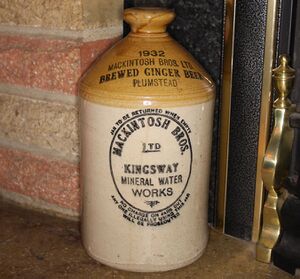Ginger beer
see also: Ginger ale
| Ginger beer | |
|---|---|
 |
| This locally produced ginger-beer container has been on our fireplace for 28 years! | |
| Servings: | Servings: 25 - 1 gallon of ginger beer |
| Calories per serving: | 13 |
| Ready in: | 5 days until it is ready for drinking |
| Prep. time: | 30 minutes |
| Cook time: | None |
| Difficulty: | |
| Recipe author: | Chef |
| First published: | 2nd January 2013 |
Ginger beer is a type of carbonated soft drink or occasionally, alcoholic beverage flavoured primarily with ginger, lemon and sugar. It originated in England in the mid 1700s, and it reached its peak of popularity in the early 1900s. The original recipe requires only ginger, sugar, and water, to which is added a gelatinous substance called "ginger beer plant" (see below).
Fermentation over a few days turns the mixture into ginger beer. Lemon may be added. A simple version of this recipe can be made at home today in which the following is bottled in a 2 litre bottle: grated fresh ginger, sugar, a small amount of baker's yeast, and (optionally) lemon juice.
It is sealed at room temperature for a day or two before refrigerating.
Instead of using the ginger beer plant, some other form of live culture may be used to produce fermented ginger beer. This is often baker's or brewer's yeast, but can also be a culture of lactic acid bacteria, kefir grains, or tibicos. Ginger beer is fizzy due to carbon dioxide.
The alcohol content when produced by the traditional process can be high, up to 11%,/[2 although it is possible to ferment ginger beer in such a way as to produce little alcohol. Ginger beer may be mixed with beer (usually a British ale of some sort) to make one type of shandy, and with Gosling's Black Seal rum to make a drink, originally from Bermuda, called a Dark 'N' Stormy. The soda version of ginger beer is the main ingredient in the Moscow Mule cocktail.
The beverage produced industrially today is often not brewed (fermented). Such ginger beer is carbonated with pressurised carbon dioxide, does not contain alcohol, and is sold as a soft drink. Ginger beer is similar to ginger ale except that it has a significantly stronger ginger taste, often being described as ginger ale with a kick to it.
Its other distinctive properties include its traditional cloudy appearance, its predominately citrus sour taste base and its spicy ginger bite.
This recipe is taken from "Modern practical cooking" - circa 1900
Ingredients
Printable 🖨 shopping 🛒 list & 👩🍳 method for this recipe
- 1 gallon boiling water
- 14 oz loaf sugar
- 1 lemon
- ¾ oz lump of ginger, bruised
- ½ oz solid yeast
- 2 teaspoonfuls of castor sugar
- 1 teaspoonful of cream of tartar
Method
- Wipe the lemon and peel very thinly
- put the rind in a large jar or pan, and add the lump sugar, ginger and cream of tartar
- Pour boiling water over these ingredients, and stir together. Leave until lukewarm.
- Mix the yeast and castor sugar together until they become liquid, then stir into the other ingredients with the lemon juice.
- Partly cover
- Leave in a warm place for 12 hours
- Remove the scum, strain the ginger beer and bottle
- Cork the bottles very securely and tie the corks with wire
- Leave for about 4 to 5 days
Serving suggestions
Pour into a glass, being careful to leave the sediment behind
Modernising this recipe.
I would be inclined to use jaggery in place of 'lump sugar', or just use brown sugar or castor sugar.
Use a little more than 1/2 teaspoon of brewers yeast instead of solid yeast.
Store the bottles in a cool place and take very great care when handling or opening. Even I can remember my Grandfather's legendary tales of ginger beer bottles exploding in the night and setting up a chain reaction.
Peeling ginger
There is no need to peel ginger. As a result of attending a Thai cookery demo, we have learnt that peeling ginger is unnecessary unless for aesthetic purposes as the skin is high in fibre and full of flavour. However, do remove any bits that have become tough or woody.
Discover Cookipedia's Culinary Creations on Pinterest
Explore the vibrant world of Cookipedia through our Pinterest page! We've curated a stunning collection of recipes that highlight the beauty of home-cooked dishes. It's the perfect way to visually navigate our extensive recipe library and get inspired by the flavors we’ve shared over the years. Dive in and discover your next favorite meal—one picture at a time!